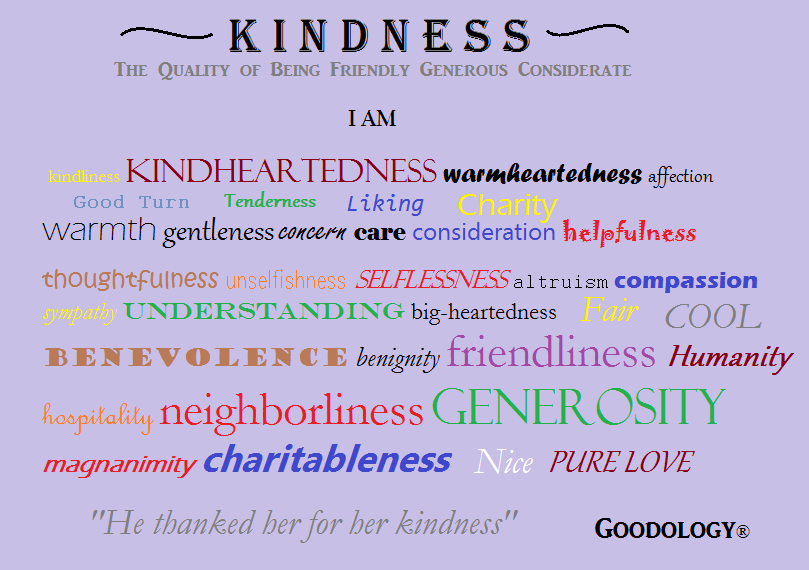THOUGHTFULNESS (consideration/kindness)


Making Ethical Decisions
SPACE: A Tool to Support Thoughtfulness

Learning to Be Thoughtful
J.R. Miller, 1898
(from his book, "Young People's Problems")
One of the finest things in a complete Christian character, is thoughtfulness. It gives a wondrous charm to a life. It makes one a blessing wherever he goes. It tempers all his conduct, softening all natural harshness into gentleness, and giving a spirit of kindliness to his every word and act, and to all his bearing.A thoughtful person does not have to be asked to help others — he helps, as it were, instinctively. He is ever ready . . .
to do the obliging thing,
to say the encouraging word,
to show an interest in the life of others,
to perform those countless little kindnesses which so brighten the common pathway.He does not make his life an intrusion to others, a constant irritating influence. He never meddles with other people's affairs — but respects the individuality and the rights of everyone. He curbs his curiosity, and does not pry into matters of which he has no right to know. He is most careful not to touch others at sensitive points. If anyone has a physical deformity or any feature which is marred, he is careful in conversation never to refer to it, and seems never to notice it, or to be conscious of it.
Thoughtfulness reveals itself quite as much in what it does not do — as in the things it does. Many people make their very goodness so obtrusive as to do harm, and give pain to those they would help. They are too anxious to be helpful. They intrude upon others, pressing their offers of kindness upon them in ways which become, if not offensive and impertinent, at least burdensome. When their friends are in sorrow, they are sincerely eager to give comfort; but they fail to understand the sacredness of grief, or to respect the craving of sad hearts for quiet, and allow their eagerness to become intrusiveness.
There is no more delicate test of thoughtfulness, than that which sorrow furnishes. Usually love's sweetest and best service then is rendered in the quietest expression of sympathy, certainly with no undue pressing of one's self into the presence of the friends who are in trouble, and with no over-eager offer to help. Then, unless from personal experience of grief, one has been prepared for giving effective sympathy — one would better not seek to be a privileged comforter.
Thoughtfulness has a wide field for its ministry in the family circle and in the daily household life. Perhaps few young people come by this grace naturally, and are born with it. Usually it has to be learned. Most of us think first of ourselves and our own comfort and convenience — and are not apt to think how our words, acts, and dispositions will affect others. We say what at the moment we feel like saying, not stopping to ask whether it will give pleasure or pain to those who must hear it. We like to say, saying it too with some pride, that we are plain, frank people, honest and outspoken. We are sincere though brusque, not realizing that our brusqueness and plainness often hurt gentle hearts. We do the thing we feel inclined to do, because it pleases us, not remembering that true love seeks not its own — but thinks first of the comfort and pleasure of others.
Without being aware of it, many of us are miserably selfish in our life among others. We practically forget that there are any other people, or that we ought to make any sacrifices, or practice any self-denials, for their sake. Young people at home, for example, will indulge themselves in sleep in the mornings, coming down late to breakfast, not thinking of the trouble they cause to those who have to do the work, nor how they interfere with the order of the household. Thoughtfulness seeks never to add to another's burdens, never to make extra work or care — but always to lighten loads.
In much home conversation, too, there is a lack of thoughtfulness shown. Not always is the speech gentle — sometimes it is sharp and bitter, even rude. Playfulness is to be allowed, and in every family there should be a readiness to take a jest without being hurt by it. Over-sensitiveness is a serious fault. Some people are so touchy as to demand an excessive thoughtfulness — a watchfulness in all our relations with these over-gentle souls which is unreasonable, which makes friendship with them a burden. Life is too short, and has too many real duties and cares, for us to be held to such exactions of attention and kindness as these good people would demand. Yet always in our relations with others, there should be thatrefined courtesy which is part of the lesson of love that we learn from our Master, "As I have loved you — even so must you love one another." Rude words never should be spoken, even in jest.
Thoughtfulness will seek always to say kindly words, never words that will give pain — but ever those words that will give pleasure. We have no right, for the sake of saying a bright thing, to let loose a shaft, however polished, that will make a loving heart bleed! Mr. Sill says:
These clumsy feet, still in the mire,
Go crushing blossoms without end.
These hard, well-meaning hands we thrust,
Among the heart-strings of a friend.
The ill-timed truth we might have kept,
Who knows how sharp it pierced and stung?These are fragments of a lesson which might be indefinitely extended. Are you thoughtful? — that is the question. Answer it for yourself.
James Johnston has said, "Unless our religion has sweetened us to a very considerable extent — giving us the control of our temper; checked us in our moments of irritation and weakness; enabled us to meet misfortune and, in a measure, overcome it; developed within us the virtues of patience and long-suffering, making us tender and charitable in our judgments of others; and generally diffusing about us an atmosphere that is congenial and winsome — whatever else we may have gained, one thing is sure, our religion is not having its perfect work in us. And, even though our Christian life is clear and positive, it is only as a gnarled and twisted apple-tree which bears no fruit — only as a prickly bush that bears no roses. The very thing which of all others we should have — is the very thing in which we are most deficient. A Christian life without sweetness, is a lamp without light, salt without savor."
We all know in our own experience the value of sincere and Christly thoughtfulness. We do not like to come in contact with thoughtless people. We know well how it hurts and how unbeautiful, how unchristian, it seems when we see it in another, and when our heart is the one that suffers from its harsh, rude impact. We all long for thoughtfulness in others; our hearts hunger and thirst for it. It is bread and wine to us.
What we long for in others, in their relation to us — we should be ready to give to them. What in others hurts us, gives us pain — we ought to avoid in our contact with others. Thoughtfulness is one of the finest, ripest fruits of love, and all who would be like the Master must seek to learn this lesson and wear this grace.
– Is a Gift to Yourself –
Thoughtfulness. A simple enough concept; yet not always easy to practice. Once mastered, however, it is the greatest gift you can give; and not just to friends and loved ones on special occasions and holidays…but to everyone, always. And, as you establish yourself as thoughtful to others, they'll go out of their way to please you back.
Thoughtfulness is a habit; internalized, it becomes a way of life, a part of our being. But it does take practice. Where do we start? Our daily life. Here are some good practice exercises. Do this for 21 days, as that's how long it takes to form a new habit (actually, we don't "form" new habits as much as "replace" old, ineffective ones).
Thoughtful people don't wait, they "create" opportunities to make life brighter and more enjoyable for those around them. But, how? Simple things. Holding the door open for anyone near you, regardless of gender or appearance. Soon, it's automatic, and even comes with a smile (and a smile back in return). When a baby in a restaurant is making a bit more noise than is comfortable, and you see the parent looking embarrassed, smile and comment on how cute the baby is.
A thoughtful person is always quick to pay a compliment (especially to those who don't often receive them), realizing the value it sometimes has beyond the obvious!
As you begin to pour your coffee at the local 7-11 store, and spot the next customer in line waiting for you to finish, pour the coffee into their cup first. He or she will be amazed (believe me) and delighted. They'll have learned something as well, and possibly do the same for another person tomorrow.
A thoughtful person parks a bit further from the entrance to the store or the post office, leaving closer spaces for those not as nimble, not covered by handicap status, or really in a hurry. You might ask, "Why should I do that? Nobody will know why I'm doing this."
Two reasons: Number one, it's the right thing to do, which makes you feel better about yourself, which in turn enhances self-esteem. Number two, as touched on earlier, by repeating thoughtful acts, they become habitual. Then, when it really counts, you'll already be doing them naturally.
Not only will you make the world a kinder place to live, but because of the precedent you've set with people, they'll go out of their way to make you happy as well. Amazing how it works. Again, try it for the next 21 days. I guarantee you'll see a delightful difference.